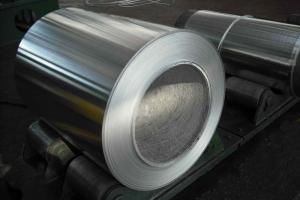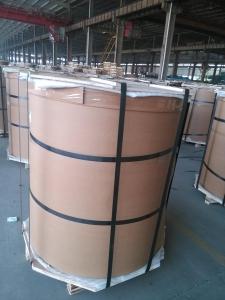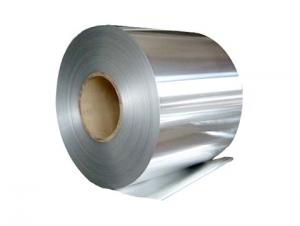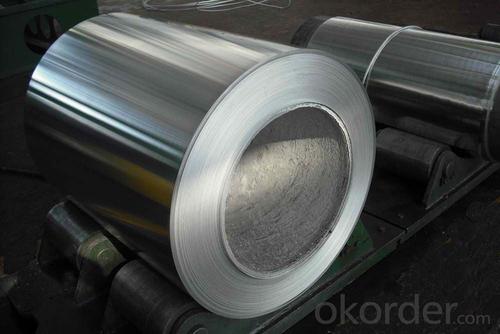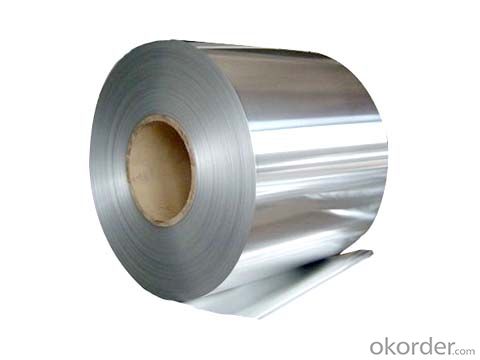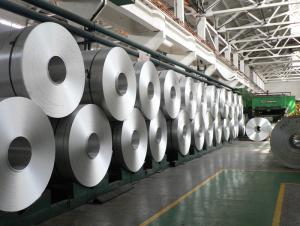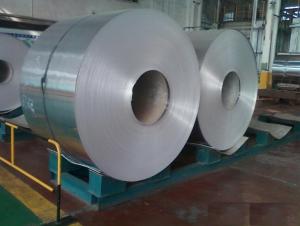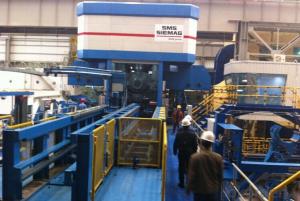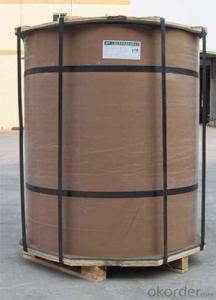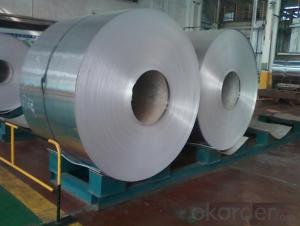Aluminum Sheet Metal Coil - Direct Casting Aluminium Foil Stock in Coil AA8019
- Loading Port:
- China Main Port
- Payment Terms:
- TT or LC
- Min Order Qty:
- -
- Supply Capability:
- -
OKorder Service Pledge
OKorder Financial Service
You Might Also Like
1.Structure of Product Description
Direct Continuous Aluminium Foil Stock in Coil is one semi-finished aluminium material. This strip can be rolled down to aluminium foil. It is widly used in the production of light guage foil, pharmaceutical foil, household foil,container foil ect.
2. Main features of the product
a.Competitive price---We have our own mills and can produce mill finished aluminium coils, so we can control the production cost better.
b.Professional after-sale service---We have more than 15 years exportation experience and you need not worry about the exporation problems.
c.Fast delivery time---We can control the delivery time within 35 days.
3.Image
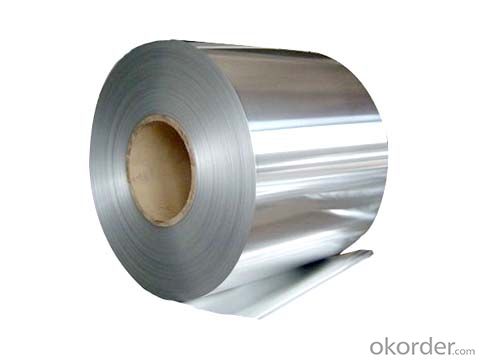
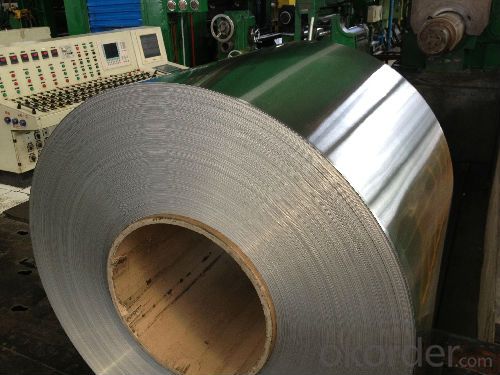
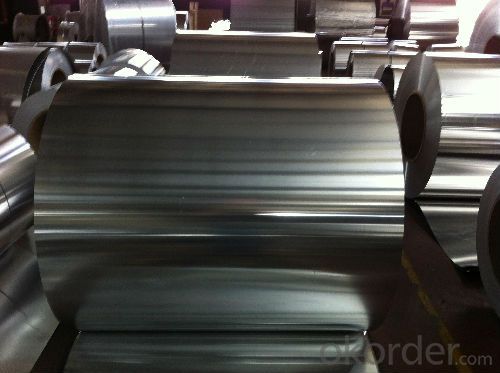
4.Products Specification
| Alloy | Temper | Surface | Profile | Coil ID |
| AA8079 | H14 | Free of defeats | -0/+1% | 405mm |
5. FAQ
What is the quality standard?
---Usually our standard is GB3880-2006
What is the largest width?
---It is 2300mm
What is the MOQ?
---Usually we can accept 80 tons.
- Q: How are aluminum coils tested for mechanical properties?
- Aluminum coils are tested for mechanical properties through a series of standardized tests that evaluate their strength, ductility, and other relevant properties. Some common methods used for testing aluminum coils include tensile testing, hardness testing, and bend testing. Tensile testing is one of the most widely used methods to assess the mechanical properties of aluminum coils. This test involves applying a pulling force to a small section of the coil until it breaks. The force and elongation are measured throughout the test, and these values help determine the coil's ultimate tensile strength, yield strength, and elongation at break. Hardness testing is another important evaluation method that measures the resistance of the aluminum coil to indentation or scratching. It gives an indication of the coil's ability to withstand external forces. Different hardness testing methods, such as Brinell, Rockwell, and Vickers, can be used depending on the specific requirements. Bend testing is performed to assess the ductility and formability of the aluminum coil. This test involves bending the coil to a specific angle or radius and examining it for any signs of cracking, wrinkling, or other defects. It helps determine the coil's ability to undergo forming processes without failure. In addition to these standard tests, other mechanical properties such as fatigue resistance, impact resistance, and fracture toughness can be evaluated through specialized testing methods. These tests provide valuable information about the aluminum coil's performance and help ensure that it meets the required specifications and standards. Overall, a combination of tests is employed to comprehensively assess the mechanical properties of aluminum coils, ensuring they have the necessary strength, ductility, and other properties needed for their intended applications.
- Q: Can aluminum coils be used in food processing industries?
- Aluminum coils find applications in the food processing industry. This is because aluminum possesses several advantageous properties that make it a popular choice in this field. It is a lightweight and flexible material with excellent thermal conductivity. These characteristics make it ideal for various uses such as refrigeration, heat exchangers, and ovens in food processing. Moreover, aluminum is non-toxic, resistant to corrosion, and does not affect the taste or odor of the food being processed. Therefore, it is a safe and hygienic option for food processing equipment. Additionally, aluminum coils are easy to clean and maintain, ensuring the highest standards of cleanliness and food safety are upheld. Consequently, due to their outstanding performance and suitability for food-related applications, aluminum coils are widely accepted and utilized in the food processing industry.
- Q: What do the two items (COIL:873347 HEAT: number) on the label of the raw material of aluminum coil stand for?
- COIL means aluminum coil and HEAT means heating, so together they mean hot rolled coil.
- Q: Can aluminum coils be used in cryogenic applications?
- Indeed, cryogenic applications can utilize aluminum coils. Highly regarded for its remarkable thermal conductivity, aluminum proves to be an appropriate substance for heat transfer in environments with low temperatures. Moreover, aluminum exhibits a minimal coefficient of thermal expansion, enabling it to endure the drastic temperature fluctuations inherent in cryogenic applications while avoiding notable alterations in dimensions. Nevertheless, it is important to acknowledge that aluminum coils might necessitate specific design or treatment to guarantee their resilience against exceedingly frigid temperatures and mitigate any potential concerns like brittleness or embrittlement.
- Q: Can aluminum coils be used in the production of heat exchangers?
- Yes, aluminum coils can be used in the production of heat exchangers. Aluminum is a commonly used material in heat exchangers due to its excellent thermal conductivity, lightweight nature, and corrosion resistance. The use of aluminum coils allows for efficient heat transfer and helps in optimizing the overall performance of the heat exchanger.
- Q: Are there any recycling programs for used aluminum coils?
- Indeed, recycling programs for used aluminum coils are readily accessible. Aluminum, being highly recyclable, can be melted down and repurposed without compromising its quality. Numerous recycling centers and scrap metal yards willingly accept aluminum coils for recycling purposes. Furthermore, certain HVAC companies, which frequently employ aluminum coils in air conditioning systems, have implemented their own recycling initiatives. It is advisable to consult your local recycling center or HVAC companies to obtain information regarding the specific recycling programs available for used aluminum coils in your vicinity.
- Q: just wondering if you can weld aluminum pipe to a metal pipe for a cars exuast
- i don't see why not becasue volvo uses aluminum exhaust systems.
- Q: Can aluminum coils be used in aerospace applications?
- Indeed, aerospace applications do make use of aluminum coils. The aerospace industry extensively utilizes aluminum due to its lightweight nature and impressive strength-to-weight ratio. Aircraft structures, including fuselages, wings, and landing gear, often incorporate aluminum coils. Moreover, heat transfer and cooling systems also benefit from their presence. The exceptional corrosion resistance and high thermal conductivity of aluminum coils render them fitting for diverse aerospace purposes. Furthermore, their malleability and ease of fabrication enable the creation of intricate shapes and designs necessary for aerospace components.
- Q: What are the different width tolerances for aluminum coils?
- The width tolerances of aluminum coils may differ based on specific requirements and industry standards. Typically, the range of tolerances is between +/- 0.005 inches and +/- 0.25 inches. Nevertheless, the intended use of the aluminum coils may necessitate stricter requirements or more lenient tolerances in certain applications. To ascertain the precise width tolerances for a particular application, it is vital to refer to the manufacturer's specifications and guidelines or industry standards.
- Q: What are the different hardness levels of aluminum coils?
- Aluminum coils come in various hardness levels, which are determined by the alloy and tempering process used in their manufacturing. The most common hardness levels for aluminum coils are as follows: 1. Soft (O temper): This state represents the utmost malleability and ductility of aluminum coils. It allows for extensive shaping and bending, making it suitable for applications that require such flexibility. 2. Quarter Hard (H12 temper): In this hardness level, aluminum coils have undergone a slight cold-working process to enhance their strength and stiffness. Although they are less malleable than soft coils, they still possess good formability. 3. Half Hard (H14 temper): Coils in this hardness level have undergone a moderate cold-working process, resulting in increased strength and stiffness. They are less formable than quarter-hard coils but are well-suited for applications requiring higher strength. 4. Three Quarter Hard (H16 temper): Aluminum coils in this hardness level have undergone a more intensive cold-working process, making them even stronger and less formable than half-hard coils. They are appropriate for applications that demand high strength and minimal deformation. 5. Full Hard (H18 temper): Coils in this hardness level have undergone the most extensive cold-working process, resulting in maximum strength and minimal formability. They are commonly employed in applications that prioritize high structural integrity and resistance to deformation. It is important to acknowledge that the specific hardness levels available for aluminum coils may vary based on the alloy and manufacturer. Moreover, different industries and applications may have specific requirements for hardness levels, so it is crucial to select the appropriate hardness level based on the intended use of the aluminum coils.
Send your message to us
Aluminum Sheet Metal Coil - Direct Casting Aluminium Foil Stock in Coil AA8019
- Loading Port:
- China Main Port
- Payment Terms:
- TT or LC
- Min Order Qty:
- -
- Supply Capability:
- -
OKorder Service Pledge
OKorder Financial Service
Similar products
Hot products
Hot Searches
Related keywords
